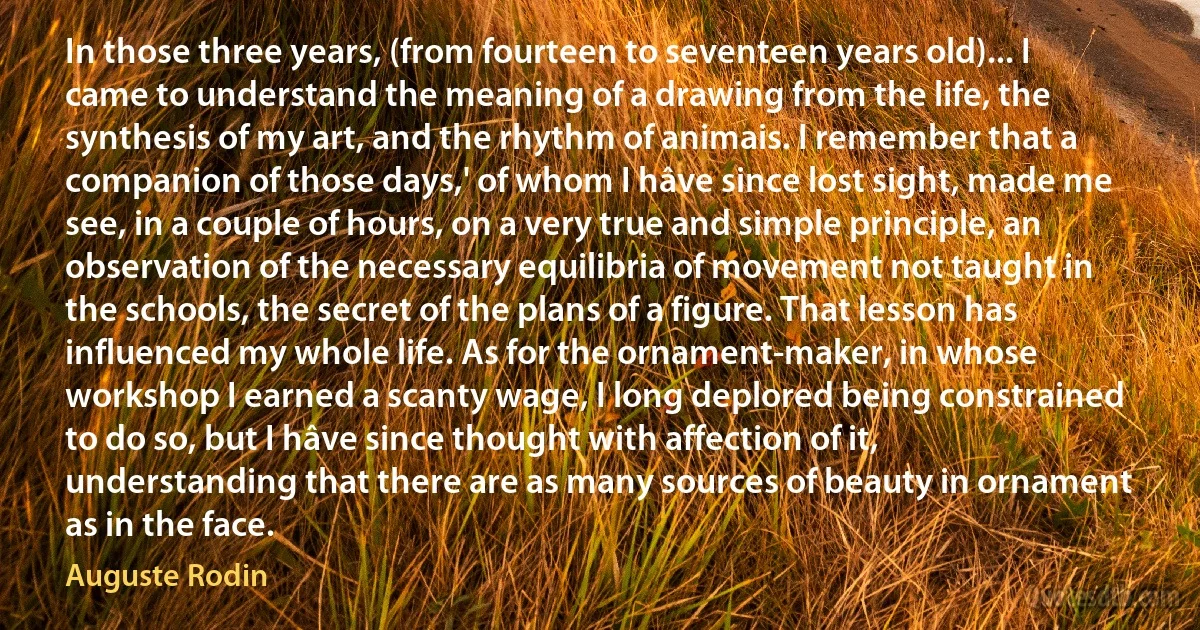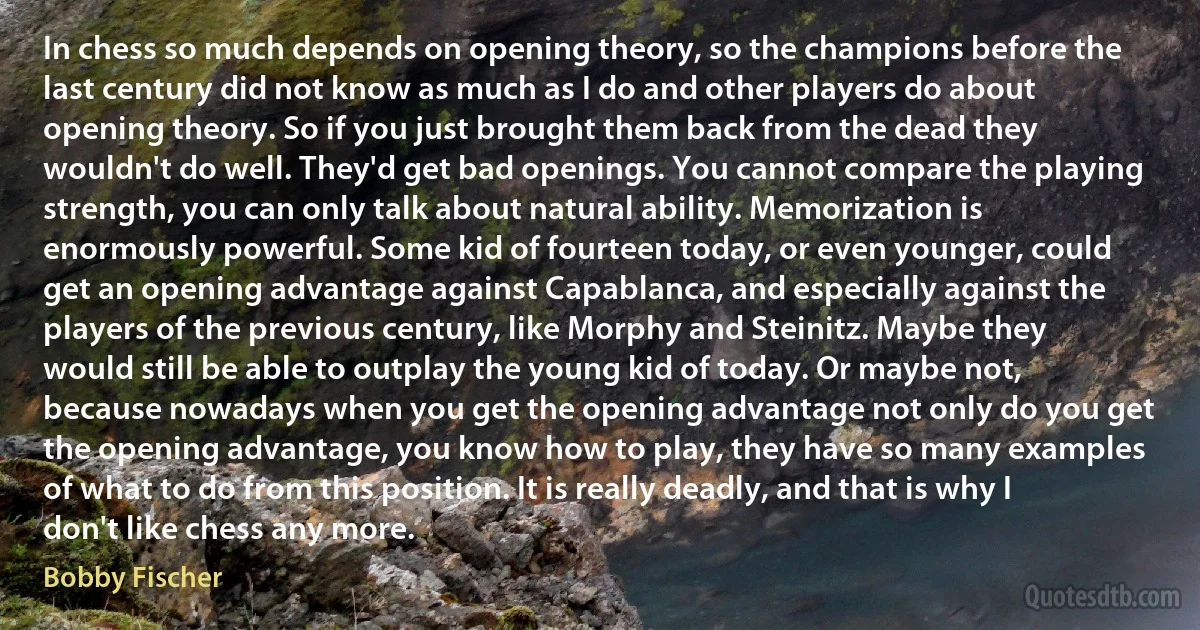Fourteen Quotes - page 3
He [Welles] was an onlooker at the clumsy, poignant suicide of "The Man on the Ledge," which took place in New York in 1938, when a boy perched for fourteen hours on a window-sill of the Gotham Hotel before plunging into the street. "I stood in the crowd outside for a long time," Welles says pensively, "and wanted to make a film of it all. But they tell me that in the Hollywood version of the film they gave the boy a reason for what he did. That's crazy. It's the crowd that needs explaining."

Orson Welles
I have found few lesbians with whom I can discourse for more than five minutes without hitting some tiresome barrier of resentment or ideology. ... Again and again over the decades, as I did my time, in frustrated boredom, in lesbian bars, trying with spectacular lack of success to make friends or just converse, I would end up gabbing for hours with some stray gay man. He might have dropped out of school at fourteen, but he had opinions, tastes, energy, wit. Is there something innately different about the gay male brain?

Camille Paglia
When I was fourteen or fifteen [...] the Yom Kippur service ended in an unforgettable way, for Schechter, who always put great effort into the blowing of the shofar-he would go red in the face with exertion-produced a long, seemingly endless note of unearthly beauty, and then dropped dead before us on the bema, the raised platform where he would sing. I had the feeling that God had killed Schechter, sent a thunderbolt, stricken him. The shock of this for everyone was tempered by the reflection that if there was ever a moment in which a soul was pure, forgiven, relieved of all sin, it was at this moment, when the shofar was blown in conclusion of the fast [...].

Oliver Sacks
I was born undisciplined. Never, even as a child, could I be made to obey a set rule. What little I know I learned at home. School was always like a prison to me, I could never bring myself to stay there, even four hours a day, when the sun was shining and the sea was so tempting, and it was such fun scrambling over cliffs and paddling in the shallows. Such, to the great despair of my parents, was the unruly but healthy life I lived until I was fourteen or fifteen. In the meantime I somehow picked up the rudiments of reading, writing and arithmetic, with a smattering of spelling. And there my schooling ended. It never worried me very much because I always had plenty of amusements on the side. I doodled in the margins of my books, I decorated our blue copy paper with ultra-fantastic drawings, and I drew the faces and profiles of my schoolmasters as outrageously as I could, distorting them out of all recognition.

Claude Monet
I am weary, having worked without a break all day; how beautiful it is here, to be sure, but how difficult to paint! I can see what I want to do quite clearly but I'm not there yet. It's so clear and pure in its pink and blues that the slightest misjudged stroke looks like a smudge of dirt... I have fourteen canvases underway.

Claude Monet
Acquittal is not enough for Roscoe Arbuckle. We feel that a great injustice has been done him ... there was not the slightest proof adduced to connect him in any way with the commission of a crime. He was manly throughout the case and told a straightforward story which we all believe. We wish him success and hope that the American people will take the judgement of fourteen men and women that Roscoe Arbuckle is entirely innocent and free from all blame.

Roscoe Arbuckle
A second conspicuous landmark... is the enunciation of the fundamental law of radioactive disintegration by Rutherford and Soddy in 1903. This law was in no sense a consequence or development of Planck's theories; indeed fourteen years were to elapse before any connection was noticed between the two. The new law asserted that the atoms of radioactive substances broke up spontaneously, and not because of any particular conditions or special happenings. This seemed to involve an even more startling break with classical theory than the new laws of Planck; radioactive break-up appeared to be an effect without a cause, and suggested that the ultimate laws of nature were not even causal.

James Jeans
Everybody knows that the great reversed triangle of land, with its base in the north and its apex in the south, which is called India, embraces fourteen hundred thousand square miles, upon which is spread unequally a population of one hundred and eighty millions of souls. The British Crown exercises a real and despotic dominion over the larger portion of this vast country, and has a governor-general stationed at Calcutta, governors at Madras, Bombay, and in Bengal, and a lieutenant-governor at Agra.But British India, properly so called, only embraces seven hundred thousand square miles, and a population of from one hundred to one hundred and ten millions of inhabitants. A considerable portion of India is still free from British authority; and there are certain ferocious rajahs in the interior who are absolutely independent.

Jules Verne
Comrades, it always affords me much gratification to meet my old comrades in arms of ten or fourteen years ago, and to live over again in memory the trials and hardships of those days. Hardships imposed for the preservation and perpetuation of our free institutions. We believed then, and believe now, that we had a good government, worth fighting for, and, if need be, dying for. How many of our comrades of those days paid the latter price for our preserved Union! Let their heroism and sacrifices be ever green and in our memory. Let not the results of their sacrifices be destroyed. The Union and the free institutions for which they fell, should be held more dear for their sacrifices.

Ulysses S. Grant
I rather doubt if man really has much to gain by substituting peace for strife, as you and Jesus Christ recommend. Sic notus Ulixes? do you think you can outwit the resourceful malevolence of Nature? God is not mocked, as St. Paul long ago warned the Galatians. When man gets rid of a great trouble he is easier for a while, but not for long: Nature instantly sets to work to weaken his power of sustaining trouble, and very soon seven pounds is as heavy as fourteen pounds used to be. Last Easter Monday a young woman threw herself in the Lea because her dress looked so shabby amongst the holiday crowd: in other times and countries women have been ravished by half-a-dozen dragoons and taken it less to heart. It looks to me as if the state of mankind always had been and always would be a state of just tolerable discomfort.

A. E. Housman
Everything that I did as Governor, and everything that I think needs to occur right now in the Federal Government, needs to be a cost-benefit analysis. What are we spending our money on, and what are we getting for what we're spending? I am of the belief that we are on the verge of a financial collapse. We can not repay fourteen trillion dollars in debt if we're spending one point six trillion dollars more than we're taking in this year and years to come. That is not sustainable... We landed on the moon, we can balance the federal budget. And that means cutting forty-three cents out of every federal dollar that we're currently spending.

Gary Johnson
He remembered his dismay at finding himself committed to a hand of cards without having honestly looked at the stakes, fourteen years ago. Had he been doing it again? But if the stakes were too frightening to consider, and the game was already lost, what value could there be in clear comprehension?

Tim Powers
Sometimes I think there must be two Yogi Berras. There is the one who grew up on the Hill in St, Louis, who's been playing ball for the Yankees for fourteen years, has a beautiful wife named Carmen and three boys, Larry, Timmy, and Dale, and lives in a nice house in Montclair, N. J. That's me. Then there's the one you read about in the papers who is a kind of a comic-strip character, like Li'l Abner or Joe Palooka. [...] I don't know that Yogi at all, because he doesn't exist.

Yogi Berra
Mael, a scion of a royal family of Cambria, was sent in his ninth year to the Abbey of Yvern so that he might there study both sacred and profane learning. At the age of fourteen he renounced his patrimony and took a vow to serve the Lord. His time was divided, according to the rule, between the singing of hymns, the study of grammar, and the meditation of eternal truths.

Anatole France
A pretext presented itself; some insult needed to be avenged, or some debt to be collected. Six battleships, fourteen cruisers, and eighteen transports sailed up the mouth of the river Hippopotamus. Six hundred canoes vainly opposed the landing of the troops. Admiral Vivier des Murenes' cannons produced an appalling effect upon the blacks, who replied to them with flights of arrows, but in spite of their fanatical courage they were entirely defeated. Popular enthusiasm was kindled by the newspapers which the financiers subsidised, and burst into a blaze. Some Socialists alone protested against this barbarous, doubtful, and dangerous enterprise. They were at once arrested.

Anatole France
Among Latin writers, the acceptations of the word nature are so many, that I remember, one author reckons up no less than fourteen or fifteen. Hence we see how easy 'tis for the generality of men, without excepting those who write of natural things, to impose upon others and themselves, in the use of a word so apt to be mis-employ'd... the very great ambiguity of this term, and the promiscuous use made of it, without sufficiently attending to its different significations, render many of the expressions wherein 'tis employ'd either unintelligible, improper, or false.

Robert Boyle
The actual expense of your colleges appears to have been very low, and would have been far lower if their patronage had been greater. The higher education nowadays is as cheap as the lower, as all grades of teachers, like all other workers, receive the same support. We have simply added to the common school system of compulsory education, in vogue in Massachusetts a hundred years ago, a half dozen higher grades, carrying the youth to the age of twenty-one and giving him what you used to call the education of a gentleman, instead of turning him loose at fourteen or fifteen with no mental equipment beyond reading, writing, and the multiplication table.

Edward Bellamy



